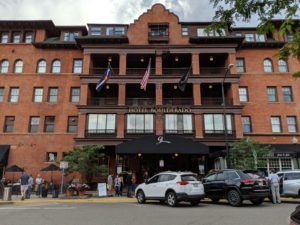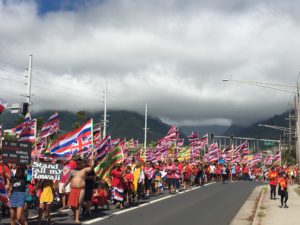Axel Beers is Editor at MuaiTime, and is among four NextGeneration/Diversity Scholarship recipient attendees at the 2019 AAN Convention, held July 11 – 13 in Boulder, Colorado. Here he shares his thoughts at this year’s conference.
It was around the time I began considering the terms of a possible platonic cuddle-agreement with the persons squeezed to my left and right, trapped between armrests and hurdling over the Pacific Ocean in an oversized tin can at hundreds of miles per hour, that I thought maybe my trip to the annual AAN Convention was a mistake. Ten hours of contortion on a red-eye flight will muddle your thinking like that. Thank God Boulder has legal dispensaries.

By the time I arrived at the Hotel Boulderado on the opening day of the 2019 AAN Convention, the Keynote Address was about to begin. Having just made a year as the editor of MauiTime and as a first-time attendee at an AAN Convention, I had no expectations. The monologues of the undocumented quickly set the tone. They reminded me that, yes, as “alternative” media we’re edgier and more off-beat than other papers, but there’s a responsibility that comes with this freedom. It’s a calling, as Patti Calhoun urged in her Lifetime Achievement Award acceptance speech at the closing of the conference, to tell stories that give voice to the voiceless and power to the powerless.
I arrived in Boulder with a sense of foreboding – not for the conference but for the islands I was leaving behind. After an evening at the Rayback Collective (in which another editor and I played the game of “guess what department they’re in,” leading to an introduction to Dave Faries who gave me the same advice Eric Kushman gave fellow first-timer Jordan Snowden: Talk to everyone), I met Triad City Beat editor Brian Clarey outside (another note to newbies: Wear the name tag). As it happened, we were both finalists for the Best Political Column Award (which he won, well deserved), and we split a Lyft back to the Boulderado. We talked about the issues in our respective cities, and after taking his recommendation for a local dispensary, I went for a walk and called home. Maui was on fire.
The blaze burned approximately 10,000 acres of fallow fields abandoned in the wake of the exit of corporate sugarcane agriculture. It was an ordeal for our little island, but not the story I was dreading. No one was injured, and no homes destroyed. It was unlike the news that followed days later, when 36 peacefully demonstrating kupuna, or elders, were arrested on Maunakea by riot gear-armed police for “obstructing a government operation” – or, as the kupuna would put it, protecting a sacred mountain.
The monologues of the undocumented were expanded upon by Joel Dyer, who spoke about his coverage of immigrant detention centers in his Jul. 12 session. As a group, we brainstormed ideas to address the topic, which Joel emphasized was more than just a story. It was an ongoing atrocity, requiring people to boldly take a stand against injustice. Both-sideism was dangerous, he argued, when the injustice and harm is as deep as the horror faced by immigrants held in detention centers.
I agreed that there are indeed times when giving voice to the voiceless and power to the powerless means taking a stand with the oppressed.

When I woke up the day after arriving back home, I checked the news and with friends and social media for updates on the standoff I knew was about to occur, given our governor’s announcement that construction would commence on a sacred mountain that has been a source of contention for years. The images were striking. Native Hawaiian activists, who identify as kia‘i (protectors), had chained themselves to cattle grates in the road to block the construction of the Thirty Meter Telescope atop Maunakea. Nothing happened until a day later when the kupuna were arrested. Then, another standoff, which persists today more than 50 days later, although the number of protestors has since risen into the thousands. “We’re rebuilding the Hawaiian Kingdom from the mauna (mountain) out,” one kumu (teacher) told me.
When I sat in the AAN Annual Meeting as a representative for MauiTime, someone nominated my boss and publisher Tommy Russo to chair the Convention seat (or something like that; forgive me, again, it was my first time there). I was surprised our little paper got some attention, then my neighbor filled me in on the joke: Everyone wants an excuse to come to a convention on Maui. It was funny, and for the record here’s an open invitation to anyone who wants to come over. I’ll show you around.
But it got me thinking: In today’s climate, what topic or theme would I organize around for a convention for fellow alt-weeklies?
The answer, especially in a place like Maui where the rich play at the expense of Indigenous land, resources, and labor, would have to be Indigenous rights. Whether on Maunakea or in the Amazon, or regarding the issues of migration, sustainability, and community, it’s time to understand that the dominant colonial paradigm has failed in many ways and that Indigenous cultures hold wisdom and solutions that are at risk of extinction.
This is all a roundabout way of saying that the annual AAN Convention is more than a gathering of eccentric, off-beat alternative media weirdos. It’s a gathering of ideas and an incubator for creativity. It’s a source of inspiration, new friends, and resources.
As was said at Saturday’s award ceremony: “May we long kick the asses of the motherfuckers out there.”

